Submissions
When submitting pages for critique, our group uses the following format.
- Attached document should be in Word Format (doc/docx).
- Uses 12pt Times New Roman.
- Lines are double spaced.
- As a convention we use the Chicago Manual of Style.
- Email should contain cover content (Example Below).
- [Until email lists are tested and ready (in testing)] the “To” field should contain all the members participating in the critique period. Member participating will receive an email with all participants the day following the business meeting.
Submission Template
Subject: re: [Critique-202X-XX] Request for Pages
Attachment: <document for critique.docx>
Body:
Member: <your name>
Title: <Title of work submitted>
Genre: <Young Adult, Thriller, Crime, Suspense, Non-Fiction, Memoir, etc. >
Typical Story Arc: <pattern story follows>
Rating: <A general rating of the content, and sensitive subject matters (horror/gore, sex, violence, etc.)>
Sensitivity: <List anything that other critiquers need to be aware of when critiquing your work>
Synopsis: <context for where in the story critique selection takes place>
Critique Requested: <Line Item (editing), Story, Consistency, Character Development, etc.>
Additional Notes: <anything the person doing the critique may need to know about the selection>
Critique Period Email Examples
Critique Periods usually consist of three steps. The moderator sending out a request for pages, participants replying to the email with their pages for the period, and finally the participant emailing their critiques to the respective participants.
Admin sends out the initial request for pages email:
TO: critique-<year>-<period>@roswellcritiqueadmin
FROM: AnAdmin@roswellcritique.com
SUBJ: [Critique-<year>-<period>] Request for Pages
BODY:
This session’s submissions will be coming from –
Critique Member 1 critiquemember@emailaddress.com
Critique Member 2 critiquemember2@emailaddress.com
Critique Member 3 critiquemember3@emailaddress.com
Summary –
There will be three members submitting with 18 pages each (36 total pages divided by 2 = 18) to the above members.
Please reply to this email with your pages for the period. Send your critiqued pages directly to the corresponding member using their email address above.
Member sends their pages:
TO: critique-20XX-XX@roswellcritique.com
FROM: critiquemember@emailaddress.com
SUBJ: re: [Critique-2023-02] Request for Pages
ATTACH: MyPages.docx
BODY:
<See the Submission Template above.>
Member sends their critique:
TO: critiquemember1@emailaddress.com
FROM: critiquemember2@emailaddress.com
SUBJ: My Comments
ATTACH: CritiquedPages.docx
BODY:
Great work! See my comments attached.
Critiquing
Common Problems
When downloading a document from email, it may be in a read-only state or folder. There are two things to check in this case:
- Save document to another folder.
- In Word, select File:
-
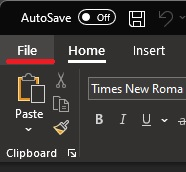
- Save As, then Browse
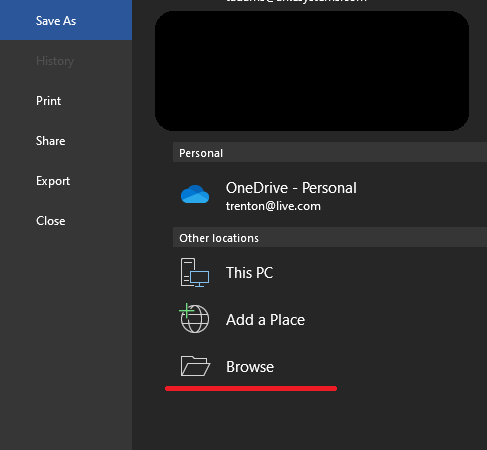
- Select/Create a folder
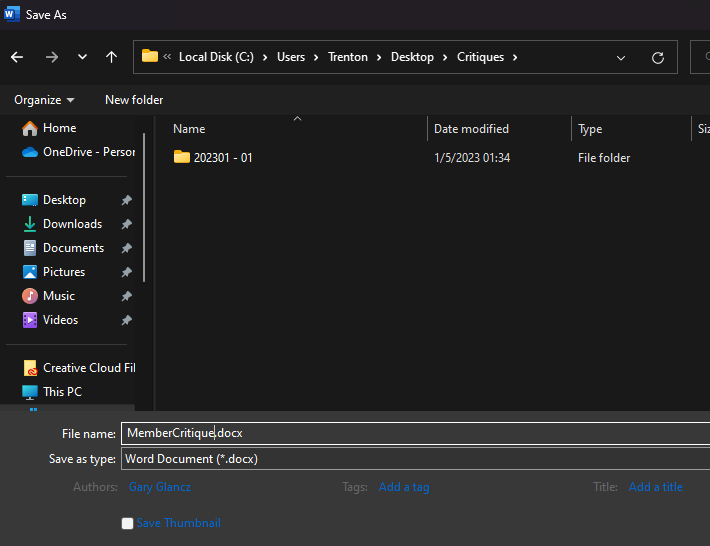
- Save!
- Click the enable editing button

The Critique
The first thing to do is to enable Change Tracking by selecting Review->Track Changes -> Track Changes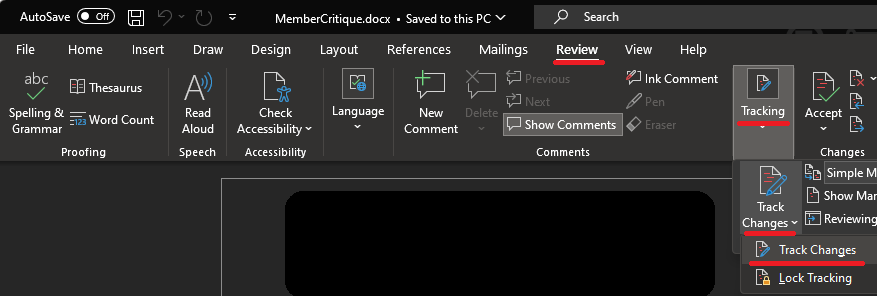
This will then show changes made without overwriting the original like so:
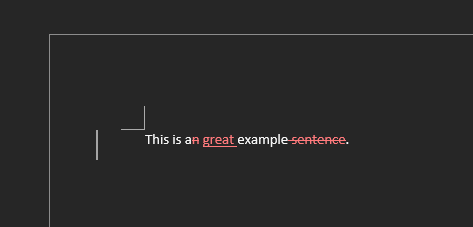
To leave a comment, highlight the relevant portion of the text then right-click and select “New Comment“

This will add a note to the side that looks like:

Returning Submission
When the critique is finished. Save it and attach it to a reply to the person that submitted the work. Feel free to leave additional comments in the email itself.
Do No Harm
Critiques need to be constructive. Keeping in mind, “Do no harm” is effective. The two sides of this are:
- One is, don’t pull punches. Give an excellent critique.
- Second is don’t attack the writer. Saying something like “Why are you writing?” is not constructive. Avoid judgmental language (“You should,” “You are,” etc.). Phrases like, “I think . . .” “Maybe . . .” and “Consider . . . ” are ways to make the critique about the writing, not the writer.
We’re all here to become better writers, driving away other authors hurts the group.